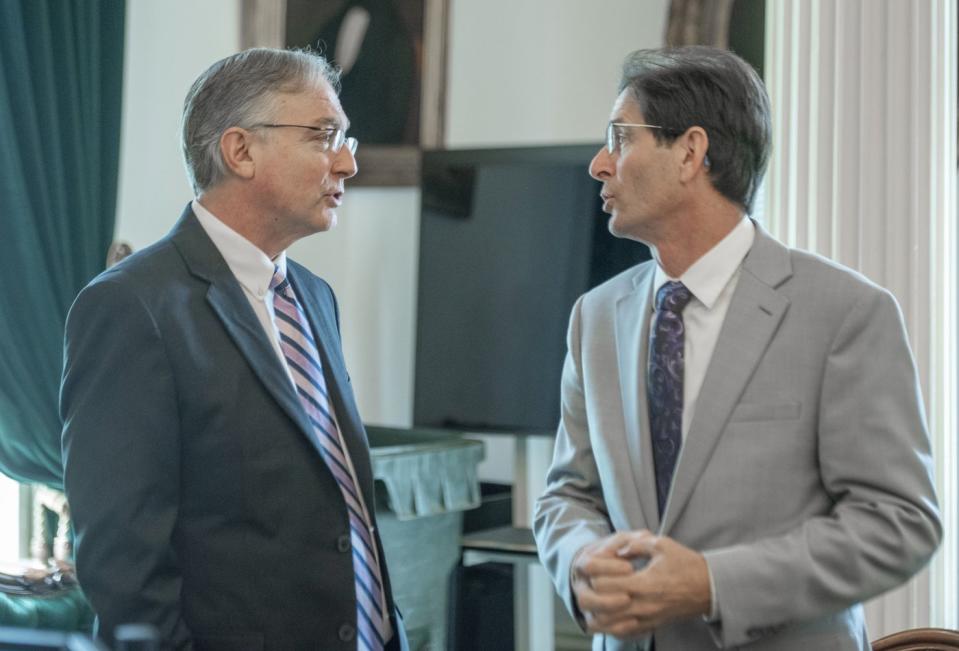Vermont Legislature overrides governor, passing overdose prevention, renewable energy, tax measures
The Democratic-controlled Vermont Legislature on Monday overturned a number of the Republican governor's vetoes, passing measures to prevent drug overdoses, restrict a pesticide that's toxic to bees and to require state utilities to source all renewable energy by 2035.
But the Legislature failed to override Gov. Phil Scott's veto of a data privacy bill that was considered to be among the strongest in the country. It would have allowed consumers to file civil lawsuits against companies that break certain privacy rules. Scott vetoed the legislation last week, saying it would make Vermont “a national outlier and more hostile than any other state to many businesses and non-profits.”
The Vermont House voted to override his veto but the Senate sustained his decision.
The vote came after the Legislature reconvened Monday to try to override Scott’s vetoes of seven bills. Each chamber needed two-thirds of those present to vote to override to be successful in passing the bills.
Senate President Pro Tem Philip Baruth, a Democrat, thanked colleagues at the end of the day, calling it “an incredibly productive day, a long day and an exhausting day in many ways but with brilliant results.”
Gov. Scott, on the other hand, called it a sad day for Vermonters "who simply cannot afford further tax burdens and cost increases. Many will talk about these votes as a major loss for me, but it’s really a major loss for Vermont taxpayers, workers and families.”
Scott said last month that the Legislature is out of balance and at times “focuses so much on their goals they don’t consider the unintended consequences.” While he said his vetoes aren’t popular in Montpelier, “I’ll take that heat when I believe I’m making the right choice for the everyday Vermonter,” Scott said.
The drug overdose prevention law enacted by the Legislature allows for a safe injection site in Vermont's largest city of Burlington where people can use narcotics under the supervision of trained staff and be revived if they take too much.
The center will provide referrals to addiction treatment as well as medical and social services. It also will offer education about overdose prevention and distribute overdose reversal medications.
“The data is clear. Overdose prevention centers save lives, connect people to treatment, reduce pressures on emergency rooms and Emergency Medical Services, and reduce public drug consumption and discarded supplies in our communities,” Baruth said in a statement.
The new law allocates $1.1 million in fiscal year 2025 to the Vermont Department of Health to award grants to the city of Burlington to establish such a center. The money will come from the Opioid Abatement Special Fund made up of Vermont’s share of a national settlement with drug manufacturers and distribution companies. Before then, the Health Department is required to contract with a researcher or consultant to study the impact of the overdose prevention center pilot program.
Two years ago, the first sanctioned overdose prevention centers in New York City opened, according to the Drug Policy Alliance. Rhode Island is expected to open one in Providence this summer.
By Monday afternoon, the state House and Senate had overturned the governor's veto of a bill that requires state utilities to source all renewable energy by 2035, making Vermont the second state with such an ambitious timeline. Scott had said the renewable energy bill would be too costly for ratepayers. Under the legislation, the biggest utilities will need to meet the goal by 2030.
"The renewable energy standard will put Vermont on track to achieve 100% renewable electricity by 2035, dramatically reducing planet-warming carbon pollution and saving Vermonters money over time," Baruth said in a separate statement. He called the governor's veto an attempt to continue rejecting “critical progress on climate action" at a time when Vermonters still are facing "the impacts of recent climate disasters.”
The Legislature also enacted a property tax bill to pay for education that will increase property taxes by an average of nearly 14% and create a committee to recommend changes to make Vermont’s education system more affordable. Scott has said Vermonters cannot afford double-digit tax increases.
In addition, the Legislature overrode Scott's veto of a measure that restricts a type of pesticide that’s toxic to bees. The Legislature passed the bill after New York Gov. Kathy Hochul signed off on what she described as the nation’s first law last year to severely limit the use of neonics in her state. In vetoing the bill, Scott said it was "more anti-farmer than it is pro-pollinator.”
Lisa Rathke, The Associated Press

 Yahoo Finance
Yahoo Finance 

